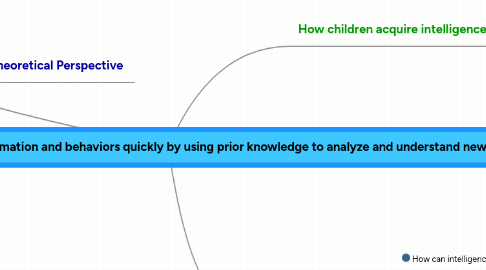
1. Theoretical Perspective
1.1. Spearman's g
1.1.1. Ability to process information quickly
1.2. Cattell's Fluid and Crystalized Intelligence
1.2.1. Fluid - is a person's ability to acquire new knowledge quickly and adapt
1.2.2. Crystalized - is the knowledge and skills a person has accumulated from their experiences and education.
1.3. Gardner's Multiple Intelligence
1.3.1. Linquistics - ability to use language effectively
1.3.2. Logical-mathical - ability to reason logically, math and science.
1.3.3. Spatial - ability to notice details of what one sees and to imagine and manipulate visual objects in ones mind.
1.3.4. Musical - ability to create, comprehend, and appreciate music.
1.3.5. Bodily-kinesthetic - ability to use one's body skillfully.
1.3.6. Interpersonal - ability to notice subtle aspects of other people's behaviors.
1.3.7. Intrapersonal - awareness of one's own feelings, motives, and desires.
1.3.8. Naturalist - ability to recognize patterns in nature and differences among natural objects and life-forms.
1.4. Sternberg's Triarchic Theory
1.4.1. Environment context in which behavior occurs
1.4.2. Prior experiences effect on tasks
1.4.3. Cognitive processes
1.5. Distributed Intelligence
1.5.1. Support from their physical, social, and cultural environments. The use of objects to complete tasks.
2. How children acquire intelligence - Many factors are involved in the development of a child's intelligence. Listed a just a few of these factors.
2.1. Cultural Bias
2.1.1. Socioeconomic status
2.1.2. Discrimination practices
2.1.3. Motivation
2.2. Gender Differences
2.2.1. Male
2.2.2. Female
2.3. Environments
2.3.1. Home Environment
2.3.1.1. Financial Resources Available
2.3.1.2. Parent's level of education
2.3.1.3. Parent interaction developing prior knowledge
2.3.1.4. Child's nutrition and health
2.3.2. Educational Environment
2.3.2.1. Learning styles met
2.3.2.1.1. Sensory
2.3.2.1.2. Experience - Prior knowledge
2.3.2.1.3. Body movement
